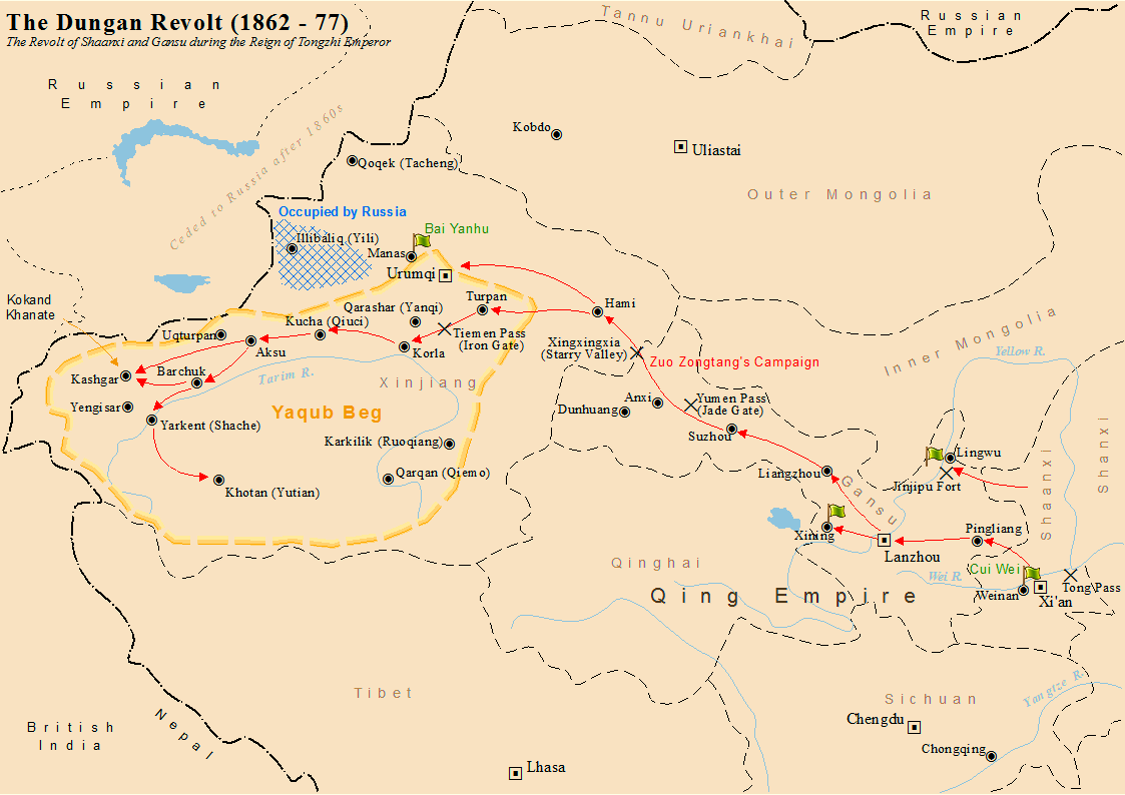|
Dungan Revolt (1862–1877)
The Dungan Revolt (1862–1877) or Tongzhi Hui Revolt (, Xiao'erjing: تُجِ خُوِ لُوًا, dng, Тунҗы Хуэй Луан) or Hui (Muslim) Minorities War was a war fought in 19th-century western China, mostly during the reign of the Tongzhi Emperor (r. 1861–1875) of the Qing dynasty. The term sometimes includes the Panthay Rebellion in Yunnan, which occurred during the same period. However, this article refers specifically to two waves of uprising by various Chinese Muslims, mostly Hui people, in Shaanxi, Gansu and Ningxia provinces in the first wave, and then in Xinjiang in the second wave, between 1862 and 1877. The uprising was eventually suppressed by Qing forces led by Zuo Zongtang. The conflict began with riots by the Hui and massacres of the Han Chinese, followed by the revenge massacres of the Hui by the Han. It resulted in massive demographic shifts in Northwest China, and led to a population loss of 21 million people from a combination of massa ... [...More Info...] [...Related Items...] OR: [Wikipedia] [Google] [Baidu] |
Yaqub Beg
Muhammad Yaqub Bek (محمد یعقوب بیگ; uz, Яъқуб-бек, ''Ya’qub-bek''; ; 182030 May 1877) was a Khanate of Kokand, Khoqandi ruler of Yettishar (Kashgaria) during his invasion of Xinjiang from 1865 to 1877. He held the title of Atalik Ghazi ("Champion Father"). Spelling variants In English-language literature, the name Yaqub Beg has also been spelt as Yakub Beg (Encyclopædia Britannica), Yakoob Beg (Boulger, 1878) or Ya`qūb Beg (Kim Hodong, 2004). Authors using Russian sources have also used the spelling Yakub-bek (Paine, 1996). A few publications in English written by Chinese authors spell his name ''Agubo'', which is the Pinyin transcription of the Chinese transcription of his name, 阿古柏 (). The first name, Muhammad, is subject to the usual variations in spelling as well. Ya`qūb is an Arabic name, Arabic analogue of Jacob, and Bey, Beg is a Turkic noble title. Background Beg's ethnic background is uncertain. According to his biographer, D. Boulger, ... [...More Info...] [...Related Items...] OR: [Wikipedia] [Google] [Baidu] |
Tacheng
TachengThe official spelling according to (), as the official romanized name, also transliterated from Mongolian as Qoqak, is a county-level city (1994 est. pop. 56,400) and the administrative seat of Tacheng Prefecture, in northern Ili Kazakh Autonomous Prefecture, Xinjiang. The city was sometimes called Tarbaghatay or Tarbagatai (Mongolian: 'having marmots') and in European languages as Chuguchak (based on its name in the Mongolian language). The current official Chinese name Tacheng is an abbreviation of "Tarbaghatay City". The current Uyghur name is Qöqäk transliterated from Mongolian. It is located in the Dzungarian Basin, some from the Chinese border with Kazakhstan. For a long time it has been a major center for trade with Central Asia because it is an agricultural hub. Its industries include food processing, textiles, and utilities. History In the mid-19th century, Chuguchak was considered the most important commercial center of Western China after Ghulja (Yining), ... [...More Info...] [...Related Items...] OR: [Wikipedia] [Google] [Baidu] |

